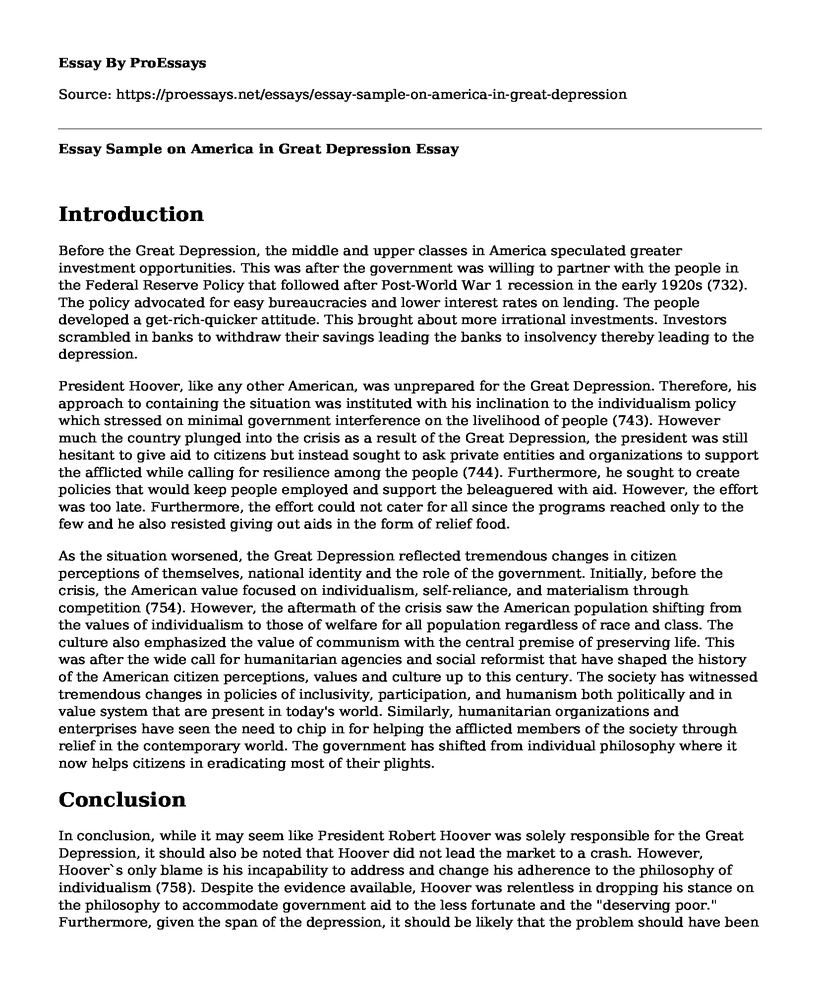Introduction
Before the Great Depression, the middle and upper classes in America speculated greater investment opportunities. This was after the government was willing to partner with the people in the Federal Reserve Policy that followed after Post-World War 1 recession in the early 1920s (732). The policy advocated for easy bureaucracies and lower interest rates on lending. The people developed a get-rich-quicker attitude. This brought about more irrational investments. Investors scrambled in banks to withdraw their savings leading the banks to insolvency thereby leading to the depression.
President Hoover, like any other American, was unprepared for the Great Depression. Therefore, his approach to containing the situation was instituted with his inclination to the individualism policy which stressed on minimal government interference on the livelihood of people (743). However much the country plunged into the crisis as a result of the Great Depression, the president was still hesitant to give aid to citizens but instead sought to ask private entities and organizations to support the afflicted while calling for resilience among the people (744). Furthermore, he sought to create policies that would keep people employed and support the beleaguered with aid. However, the effort was too late. Furthermore, the effort could not cater for all since the programs reached only to the few and he also resisted giving out aids in the form of relief food.
As the situation worsened, the Great Depression reflected tremendous changes in citizen perceptions of themselves, national identity and the role of the government. Initially, before the crisis, the American value focused on individualism, self-reliance, and materialism through competition (754). However, the aftermath of the crisis saw the American population shifting from the values of individualism to those of welfare for all population regardless of race and class. The culture also emphasized the value of communism with the central premise of preserving life. This was after the wide call for humanitarian agencies and social reformist that have shaped the history of the American citizen perceptions, values and culture up to this century. The society has witnessed tremendous changes in policies of inclusivity, participation, and humanism both politically and in value system that are present in today's world. Similarly, humanitarian organizations and enterprises have seen the need to chip in for helping the afflicted members of the society through relief in the contemporary world. The government has shifted from individual philosophy where it now helps citizens in eradicating most of their plights.
Conclusion
In conclusion, while it may seem like President Robert Hoover was solely responsible for the Great Depression, it should also be noted that Hoover did not lead the market to a crash. However, Hoover`s only blame is his incapability to address and change his adherence to the philosophy of individualism (758). Despite the evidence available, Hoover was relentless in dropping his stance on the philosophy to accommodate government aid to the less fortunate and the "deserving poor." Furthermore, given the span of the depression, it should be likely that the problem should have been addressed almost timely. However, Hoover waited up to the end of his term for him to pull stances in responding to the crisis. Despite the shortcomings in addressing the crisis, he did more than enough to make America great again.
Cite this page
Essay Sample on America in Great Depression. (2022, Dec 14). Retrieved from https://proessays.net/essays/essay-sample-on-america-in-great-depression
If you are the original author of this essay and no longer wish to have it published on the ProEssays website, please click below to request its removal:
- Paper Example on Independent, Dependent, and Intervening Variables
- Reconstruction Ideas Essay Example
- Research Paper on Public Policy: A Necessity for Social & Economic Improvement
- Essay Sample on 1960s US: Revolution, War, and Social Change
- Essay on National Housing Act: Roosevelt's New Deal to Combat Great Depression
- Paper Example on Vietnam War: Cold War Conflict & US-Soviet Proxy Wars
- Free Essay Example on Law & Sovereignty: Native American Tribes & U.S. Government







